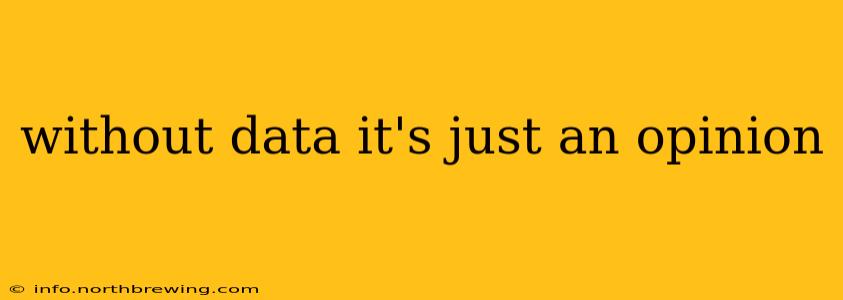Without Data, It's Just an Opinion: The Crucial Role of Data in Decision-Making
In today's data-driven world, the assertion "without data, it's just an opinion" rings truer than ever. While gut feelings and intuition can play a role, relying solely on them for critical decisions is akin to navigating a storm blindfolded. Data provides the objective evidence necessary to navigate complexity, inform strategies, and achieve measurable results. This post explores the critical role data plays in various aspects of decision-making, highlighting why informed choices are consistently superior to those based on speculation.
Why is Data Essential for Effective Decision-Making?
Data transforms subjective opinions into objective insights. Instead of relying on hunches, data allows for evidence-based decision-making, reducing risk and improving the chances of success. This is particularly crucial in areas with high stakes, such as business strategy, public policy, and even personal finance. For example, a marketing campaign launched without prior data analysis on target audience preferences is a gamble, while one informed by data on consumer behavior is far more likely to succeed.
What Types of Data are Important?
The type of data needed varies depending on the context, but generally falls into two categories:
-
Quantitative Data: This involves numerical data that can be measured and analyzed statistically. Examples include sales figures, website traffic, customer demographics, and survey results. This type of data is crucial for identifying trends, patterns, and correlations.
-
Qualitative Data: This involves descriptive information that provides context and understanding. Examples include customer feedback, interview transcripts, and social media comments. This data helps explain why certain quantitative trends exist. Combining both quantitative and qualitative data often offers the most complete picture.
How Can Data Help Avoid Bias?
Human biases, conscious or unconscious, can significantly skew our judgment. Data provides a counterbalance to these biases, offering an objective lens through which to view situations. By analyzing data, we can identify patterns and trends that might be missed through subjective observation, leading to more impartial and fair decisions.
What are the Potential Pitfalls of Relying on Intuition Alone?
Relying solely on intuition can lead to several pitfalls:
-
Confirmation Bias: We tend to seek out information that confirms our pre-existing beliefs, ignoring contradictory evidence. Data forces us to confront potential flaws in our assumptions.
-
Overconfidence: We might overestimate our own judgment and underestimate the complexity of a situation. Data helps to temper overconfidence by providing a more realistic view of the situation.
-
Lack of Accountability: Intuition-based decisions are often harder to justify or defend. Data provides a clear audit trail, making it easier to track results and learn from mistakes.
How Can I Improve My Data-Driven Decision-Making Skills?
Developing strong data-driven decision-making skills involves several key steps:
-
Data Literacy: Gain a fundamental understanding of data analysis techniques and statistical concepts.
-
Data Collection: Implement systems for collecting relevant and reliable data.
-
Data Analysis: Use appropriate tools and techniques to analyze the data and identify key trends and insights.
-
Data Visualization: Present the data in a clear and concise manner to facilitate understanding.
-
Continuous Learning: Stay updated on the latest data analysis techniques and tools.
In conclusion, while intuition can be a valuable source of inspiration, it should not replace the power of data. Without data, decisions remain mere opinions, vulnerable to biases and lacking the objective grounding necessary for informed and effective choices. By embracing data-driven decision-making, we can navigate uncertainty with greater confidence and achieve better outcomes across all areas of life.
